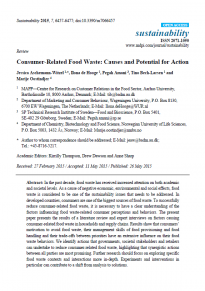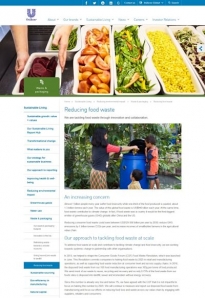Consumer Food Waste
There are a number of factors that can contribute to food loss and waste (FLW) at the consumer level:
- Improper storage – food not being used before it goes bad. Food spoilage at home occurs due to, lack of visibility in refrigerators, partially used ingredients and misjudged food needs.
- Over-Preparing – cooking or serving too much food. Cooking portions have increased over time and large meals often include more food than can be finished. In addition, people often forget to eat leftovers and end up throwing them away.
- Large Portions – commonly observed at restaurants, increased portion size largely contributes to waste. Restaurants meals are often left uneaten and edible leftovers are often left at the restaurant. All-you-can-eat buffets are particularly wasteful as extra food can't legally be re-used or donated due to health code restrictions. The common practice of keeping buffets fully stocked during business hours (rather than allowing items to run out near closing) creates waste.
- Date Label Confusion – food is prematurely discarded due to confusion over the meaning of date labels (e.g., "sell by," "best by," "use by," etc.).
- Overbuying – sales on unusual products and promotions that encourage impulse and bulk food purchases at retail stores often lead consumers to purchase items that don't fit into their regular meal plans and spoil before they can be used.
- Poor Planning – Without meal plans and shopping lists, consumers often make inaccurate estimates of what and how many ingredients they will use during the week. Unplanned restaurant meals or food delivery can also lead to food at home going bad before it can be used.
- Lack of freezing – confusion about whether a product is suitable for freezing and how best to freeze it to maintain its quality and storage life can lead to food spoilage.
Key Publications
Consumer Food Waste Fact Sheet This document focuses on why consumers waste food, how much, and what can be done to reduce this waste. This is useful for those involved in communicating strategy and policy to prevent consumer waste. | |
Consumer-Related Food Waste: Causes and Potential for Action This report focuses on factors causing consumer-related food waste in households and supply chains, and discusses how consumers’ motivation to avoid food waste and management skills of food provisioning influence food waste behaviours. | |
|
UNILEVER is working to address food waste at scale by initiating systemic change in partnership with other organizations. |















